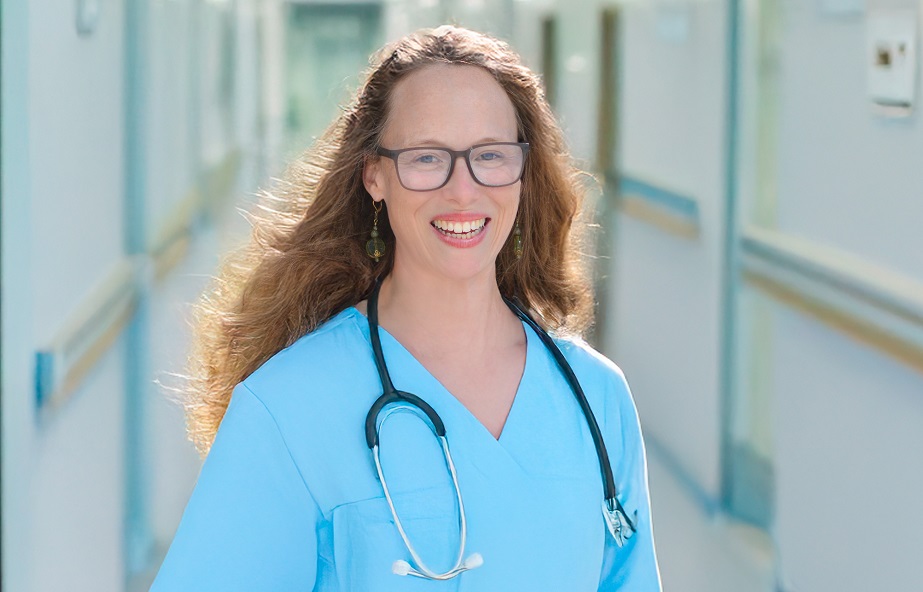Cover Model: Compassion, Persistence, Defiance in the Face of Inequity

By Annette Pinder
Dr. Elizabeth M. Harding is an academic physician who practices family medicine at Jericho Road
Community Health Center (Jericho Road) and teaches UB medical students and residents. A first-generation American and daughter of a Jamaican immigrant, Dr. Harding grew up in the Bronx and Washington Heights. “My father was Black and of Jewish descent, my mom is White and converted for marriage.”
At Jericho Road, she and her colleagues support impoverished families, refugees, asylum seekers, and immigrants, many of whom have suffered unimaginable harm. She says, “People don’t realize that refugees are individuals who are forced to leave their countries to escape dangerous situations and are relocated here by the UNHCR and the U.S. Department of Refugee Services. The choice of where they end up is out of their hands. Asylum seekers flee to the U.S. in search of protection, and are legally here for similar reasons.”
I first learned about Dr. Harding after reading an article she wrote that was published by The Huffington Post, titled “My Patient Is Fighting for His Life — And There’s a Border Patrol Agent Camped Outside His Hospital Room.” In it, she discusses her patient, a boy the same age as her own son, who is suffering from acute chest syndrome caused by sickle cell disease. Outside his door is a border patrol agent waiting to deport him once he is well enough to leave the hospital, to a place where he is sure to die due to a lack of medical care.
After college, Dr. Harding went to Union Theological Seminary in New York City. Thereafter, she attended Cornell Medical School, where she observed a 31-year-old patient under the care of multiple specialists — a cardiologist, nephrologist, dermatologist, and rheumatologist. He had lost 50 pounds over the past year. He died a year later after being diagnosed with AIDS. I wondered how we — his care team — had missed this man’s weight loss until his critical hospitalization. I realized that what he lacked was a primary care physician dedicated to coordinating his care. Recognizing the importance of primary care physicians, I decided to become one.
Following Cornell, Dr. Harding trained at Mountain Area Health Center in North Carolina and then completed her residency at the University of North Carolina in Appalachia, where she cared for people living in extreme poverty, some without running water. There were few jobs, and the school systems were severely underserved. “It was a place where residents felt trapped, disenfranchised, and prayed for the South to rise again. It was a different kind of poverty than I experienced in the Bronx. It was also a place where my family felt like outsiders — we looked different, and we didn’t fit in. We got used to people throwing things at our car.
“I started working at Jericho Road in March 2017, and for the first time in my career, I never felt more connected. I have deep, visceral beliefs about healthcare as a human right. My childhood rabbi said it was a duty to care for people, regardless of their ability to pay. This belief shapes the culture at Jericho Road, where many of our patients are refugees who grew up with nothing on Buffalo’s east side. We are a culturally sensitive, safe space that welcomes those who might otherwise be considered strangers. It makes me feel like a better person, and our new CEO, Dr. Allana Krolikowski, is the best boss I’ve ever had.”
Now, Dr. Harding is concerned about the impacts of billions of dollars in Medicaid cuts on patients’ health and the financial futures of federally qualified health centers. Still, she and her colleagues promise to keep working, aiming to keep staff and patients motivated and resilient so they don’t give in to fear or exhaustion. She says, “Many of our staff and resident physicians came here as refugees or immigrants themselves. Their courage is humbling and inspiring. A lot of us are either foreign-born or first-generation, or queer, or brown, or poor, or all of the above. Our work is driven by compassion, persistence, and defiance in the face of inequity, with a mission to serve our community.”
Hoping that we all recognize the importance of the safety net, she says, “If you allow centers like ours to close due to lack of funding, who will treat you when your resources run out and your comforts disappear? What will happen if your child needs birth control, Suboxone, or lacks health insurance because of a drug problem or mental illness, or finds themselves pregnant at 16? What will you do when you realize that we are creating a mess for someone not even born yet, whom you will love more than yourself?









